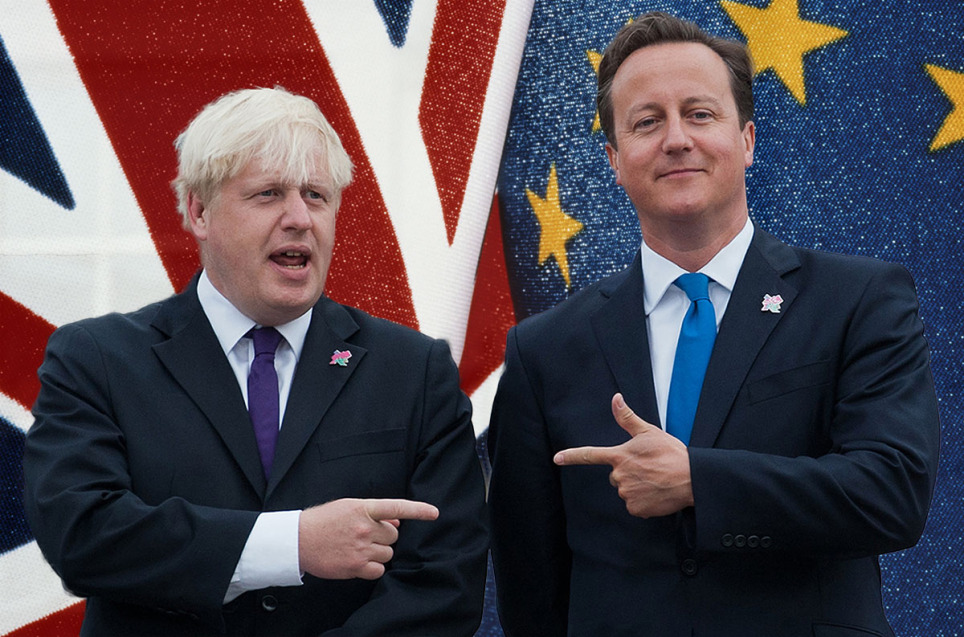In the aftermath of the UK’s vote to leave the European Union, three psychologists reflect on complacency, emotional decision-making and how we might reconcile.
MAKE TEA -NOT WAR?
‘Make Tea –Not War’ reads a sign at a corner café that I sometimes visit in genteel Sussex. The day after the referendum, though, it took on a new significance. With the country facing its biggest constitutional crisis for many decades, this quaint British refrain may not currently apply.
Admittedly, the British are not exactly pacifists and have a long history of conquest despite their tea-drinking habits. But it’s curious that it took a calamity of the scale unleashed by last week’s referendum to shake people out of their political inertia and complacency.

Suddenly, the nation has come alive. People are picketing and protesting. Political discussions are on everybody’s lips. Most have suddenly become interested in what democracy truly means as a result of a crucial question having been answered by a narrow margin. Some want to overturn the result of the vote and many sub-groups within the ‘Remain’ camp are crying foul.
It’s not my intention to speculate on who’s right or wrong in this debate. But as a dual-national who grew up on foreign and highly conflicted shores, I’ve always felt that the British treat their democracy somewhat carelessly. Many voters fail to exercise their most fundamental democratic right and don’t bother to vote. Freedom of speech is treated so cavalierly that even University students want to ‘no platform’ important speakers. On occasions, the BBC has wondered whether it should be host to the views of controversial figures. Until last week’s referendum, there was a pervasive laissez faire attitude to political events and democratic processes that was sometimes breath-taking.
Why do we become complacent, I wonder? The answer surely lies in the idea of taking something for granted, rather than regarding it as precious. It’s a problem that bedevils most marriages and long-term partnerships, among other things. We humans are not very good at valuing what we already have because we assume that our capital will last.
But I’ve wondered whether complacency might have deeper roots and whether it’s possible that some are more given to this very human quality than are others. Attachment theory suggests that our earliest caretaking experiences create a blueprint out of which we approach our relationships, including those we develop with institutions and processes. If Bowlby and others were correct, it follows that those who were raised in caring environments might find it easier to have faith in the institutions and authorities that govern them. Having been able to trust their early caretakers, these individuals might be more likely to assume that their needs will be met. Thus, they take others and the processes that others create, for granted. It’s a perfect recipe for complacency.
Perhaps one of the biggest forms of complacency comes from those who believe that the political process has nothing to do with them. These people boldly declare that they have no interest in politics – it’s a process that somehow happens ‘out there’ and isn’t something they need to bother themselves with. These individuals forget that passivity is in itself a form of resistance. It is not possible to exclude oneself from the process of politics – because we, the people, form the substance of it.
What, other than complacency would prevent someone from making the effort to vote? Surely, only the idea that others can be relied upon to deliver a result that is at least possible to live alongside, even if not ideal.
Why would the outgoing Prime Minister assume that he would win such a crucial referendum – to the extent that he felt sufficiently confident to call one, even though there was no great imperative to do so? Known as the lucky Prime Minister, Cameron bargained on his previous good fortune, assuming that it would last. And the Labour leader, Jeremy Corbyn, complacent until this week’s coup, assumed that everybody else would take care of the ‘Remain’ campaign with the result that he barely featured in it.
Complacency always involves the idea of being able to trust others, whether singly or in institutions. The result is that we are sometimes led to think that we needn’t engage in vital tasks and processes.
What is clear is that the British might not take their democracy for granted for a while, at least. The road ahead may be a tough one – and we, the people, will need to play our part. Democracy is indeed a precious and fragile thing – and complacency is surely its greatest enemy.
US THEM AND THE EU REFERENDUM
As a clinical psychologist, I’ve spent a lot of time talking to people who are feeling emotional. It’s a large part of the job. And when we’re emotional, it’s hard to think things through properly. Indeed, that’s one of the main ideas behind cognitive therapy.
If there was ever a time when we needed to think something through clearly, it was last week – when we had to decide how to vote in the EU referendum – and now, when we are dealing with the aftermath. The importance of the issues – the events of 2016 will likely have a profound effect on UK life for generations to come – is matched only by their complexity. As a psychologist I worry that some of our voting decisions – and indeed the referendum result – may have been partly the product of emotional thinking. Recent political and economic events have left many people feeling stressed, depressed, anxious, hopeless and adrift. Many have lost their jobs with the closure of traditional industries, and with them often their sense of identity and belonging. Buying or even renting a home is often out of reach. People have lost faith in politicians and feel disenfranchised. Local shops and pubs have closed leaving people isolated. Many people are struggling even to afford the basics: wages are low and unpredictable, and those just getting by on benefits are worrying about losing even those. Many families have to rely on food banks and have often felt humiliated by the experience. Public services have been cut in the name of ‘austerity’. We worry for our own and our children’s future. Emotions are running high.

In this context, many of us will have found the oversimplified stories put out by both sides, but particularly in my view by the ‘out’ campaign, much more convincing than we might otherwise have done. In extremis, people often look for someone to blame: the processes of ‘scapegoating’ and ‘othering’, and the tendency to divide the world into ‘us and them’ are well documented in social psychology. So the stories are seductive: our problems are due to an influx of foreigners threatening our livelihoods and our public services, and to paper-shuffling, ineffectual Brussels eurocrats siphoning off billions from our national coffers.
Perhaps I’m thinking emotionally myself, but I’m very worried about our future. There are huge echoes for me of earlier periods in our European history when people blamed their problems on ‘foreigners’ in their midst. The racist attacks that have been reported in the days since the referendum are deeply troubling. The 1930s and 1940s are very present in my mind. And as we know, it didn’t end well.
On the other hand, as a ‘remain’ voter I’m only too aware of the danger of othering and scapegoating people who voted to leave. That way lies huge danger too. Maybe I’m even guilty of doing that here. As psychologists we need to put our energies into helping heal, rather than worsening the rifts that this process has opened up between people. But then I’m feeling emotional. Our awareness of psychological processes doesn’t make us immune. But it should make us careful.
ALL IN IT TOGETHER
‘The best argument against democracy’, said Winston Churchill, ‘is a five-minute conversation with the average voter.’
With stock markets wobbling, political parties in disarray and the consequences of Brexit unlikely to be clear for some time, the wisdom of the voters, average or otherwise, is something many may have thought about in the last few days. How do we go forward, given the divisions revealed in the EU referendum? Especially in a situation where the vanquished are so worried about consequences of the case put by the victors.
While it’s tempting to generalise about the motivations of the opposing sides it is likely we won’t fully understand these for a while. It perhaps doesn’t help though that, whatever the actual reasons behind the Leave votes, the Leave campaign became dominated by Brexit as a means of restricting free movement of EU citizens into the UK.

I’ve argued before that the appeal of populist movements like Leave, especially in economically tough times, rests on a certain vagueness about how things will improve and also on the finding of scapegoats. So for Donald Trump, UKIP, Bernie Sanders, Jeremy Corbyn and The Scottish National Party, the sources of woe are, respectively: Muslim or Mexican immigrants, EU immigrants, The Establishment, bankers/Tories, and Sassenachs. I suggested that this appeal is a call towards what Melanie Klein termed the paranoid-schizoid position, where the world is split into good (inside oneself) and bad (projected into others), with no acceptance of greater complexity. However, when Remainers try to turn Leavers into the baddies by a similar process, it might be worth remembering that the water is muddied by these fears being more than just psychological constructs but sometimes having a concrete basis. Scots may not just be out to blame the auld enemy but may justifiably feel that the political consensus in England has moved away from them. Similarly with fears about immigration may not just be simple racism. While the best evidence suggests free labour movement is an economic good, it may be less beneficial for a low-skilled and poorly-educated worker than for a latte-swilling elitist like myself.
For Remainers it is probably too soon to think about what, if any, justice there may be in the Leavers cause. The stakes still feel too high. It’s hard to avoid the impression that, in terms of Kübler-Ross’ five stages of grief, many are still somewhere between 1 (denial) and 2 (anger). Some people are seriously advocating that this was not a properly democratic process (denial) or taking to the streets in protest (anger). Reasons I’ve come across include: the distortions of the campaign, the percentages required, or the legitimacy of referenda more generally. Some people are advocating that the UK Parliament should not honour the result, or even that the Queen get involved. Aside from the questionable sense in disregarding the votes of primarily the poorest and most disregarded people, all such arguments place a specific issue above the validity of the votes cast. Do you care about the issue so much that you are willing to defy the popular will as expressed in a national referendum? Or do you, like me, feel reluctant to put any issue above what I’d argue is the purest and most direct form of democracy? Like accepting others’ right to free speech, it’s a tough business living in a community with people who may think differently from you. The Scots may cut off but that’s not an option for the rest of us. And really, isn’t it just dodging the issue? Sooner or later we all have to get on with it together. We asked The People to speak; the challenge is that they’ve said such different things.
A shorter versions of the last two pieces originally appeared as part of a feature in The Psychologist magazine.
 Discursive of Tunbridge Wells
Discursive of Tunbridge Wells John McGowan
John McGowan 1754
1754


Comment on “Brittle England”